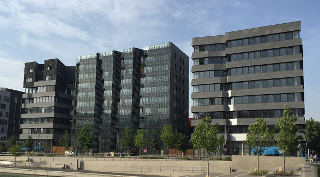Sep 21 2015
Toshiba Corporation today announced the start of a working demonstration of a positive energy building (PEB) complex that generates more energy than it consumes by using a comprehensive range of cutting edge-technologies, including renewable energy generation systems, storage batteries and energy-saving devices.
 HIKARI Buildings
HIKARI Buildings
The demonstration is a part of the Lyon Confluence Smart Community Demonstration Project, supported by Japan's New Energy and Industrial Technology Development Organization (NEDO).
The demonstration canters on the newly constructed HIKARI Buildings, a mixed development of offices, homes and shops in the Lyon Confluence district. The complex has been verified as a PEB, a status realized by installing solar power and co-generation systems to generate power, and the use of absorption-type chiller, stationary batteries as energy storage devices, and thermal storage substances for cold water heat storage, LED lighting and other energy-saving devices. All of this equipment is centrally managed by an Energy Management Systems (EMS), and energy consumption has been reduced by 10% or more than the calculated amount at the basic design phase.
A BEMS has been introduced into the office and shared areas of the building to optimize energy generation and storage an use of electricity and heat, so as to realize a PEB delivering the lowest possible operating cost. Use of Toshiba-developed image detection sensors allows micro-management of air-conditioners, lighting and blinds in the office areas to match room usage and insulation conditions, cutting use of waste energy. In the residential section, Toshiba’s “OMOTENASHI HEMS™” automatically controls devices, changing the operating mode of heater to ensure comfort and conserve energy by predicting the actions of residents cooperating with infrared motion sensors equipped in each room. The system also allows residents to monitor energy consumption and usage.
The Lyon Confluence Smart Community Demonstration Project targets achievement of the EU's 2020 environmental targets, "20-20-20," five years earlier than the 2020 target year, including achieving zero emissions in the redevelopment area. The project is utilizing technologies that Japanese companies have developed as a means to help to achieve high level energy efficiency, and Toshiba Group is the coordinator of the Japanese companies involved in the project.